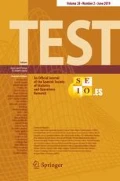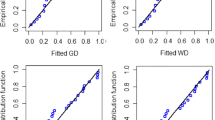Abstract
Extending the model of progressive Type-II censoring, we introduce an adaption process. It allows us to choose the next censoring number taking into account both the previous censoring numbers and previous failure times. After deriving some distributional results, we show that maximum likelihood estimators coincide with those in deterministic progressive Type-II censoring. Finally, we establish inferential results for the one- and two-parameter exponential distribution. Using the independence of normalized spacings, we present the distributions of the maximum likelihood estimators. Moreover, explicit confidence bounds and tests of hypotheses can be established.
Similar content being viewed by others
References
Balakrishnan N (2007) Progressive censoring methodology: an appraisal (with discussions). Test 16:211–296
Balakrishnan N, Aggarwala R (2000) Progressive censoring: theory, methods, and applications. Birkhäuser, Boston
Balakrishnan N, Dembińska A (2008) Progressively Type-II right censored order statistics from discrete distributions. J Stat Plann Inference 138:845–856
Balakrishnan N, Dembińska A (2009) Erratum to “Progressively Type-II right censored order statistics from discrete distributions”. J Stat Plann Inference 139:1572–1574; [J Stat Plann Inference 138:845–856 (2008)]
Balakrishnan N, Burkschat M, Cramer E, Hofmann G (2008) Fisher information based progressive censoring plans. Comput Stat Data Anal 53:366–380
Beutner E (2007) Progressive Type-II censoring and transition kernels. Commun Dependability Qual Manag 10:25–32
Burkschat M (2008) On optimality of extremal schemes in progressive type II censoring. J Stat Plann Inference 138:1647–1659
Burkschat M, Cramer E, Kamps U (2006) On optimal schemes in progressive censoring. Stat Probab Lett 76:1032–1036
Cohen AC (1963) Progressively censored samples in life testing. Technometrics 5:327–329
Cramer E, Kamps U (2001a) Estimation with sequential order statistics from exponential distributions. Ann Inst Stat Math 53:307–324
Cramer E, Kamps U (2001b) Sequential k-out-of-n systems. In: Balakrishnan N, Rao CR (eds) Handbook of statistics: advances in reliability, vol 20. Elsevier, Amsterdam, pp 301–372, chap 12
Cramer E, Kamps U (2003) Marginal distributions of sequential and generalized order statistics. Metrika 58:293–310
Herd RG (1956) Estimation of parameters of a population from a multi-censored sample. PhD thesis, Iowa State College, Ames, Iowa
Kamps U (1995) A concept of generalized order statistics. Teubner, Stuttgart
Kamps U, Cramer E (2001) On distributions of generalized order statistics. Statistics 35:269–280
Nelson W (1982) Applied life data analysis. Wiley, New York
Ng HKT, Kundu D, Chan PS (2009) Statistical analysis of exponential lifetimes under an adaptive Type-II progressive censoring scheme. Nav Res Logist (to appear)
Thomas DR, Wilson WM (1972) Linear order statistic estimation for the two-parameter Weibull and extreme value distribution from Type-II progressively censored samples. Technometrics 14:679–691
Tse SK, Xiang L (2003) Interval estimation for Weibull-distributed life data under Type II progressive censoring with random removals. J Biopharm Stat 13:1–16
Tse SK, Yang C (2003) Reliability sampling plans for the Weibull distribution under Type II progressive censoring with binomial removals. J Appl Stat 30:709–718
Tse SK, Yuen HK (1998) Expected experiment times for the Weibull distribution under progressive censoring with random removals. J Appl Stat 25:75–83
Tse SK, Yang C, Yuen HK (2000) Statistical analysis of Weibull distributed lifetime data under Type II progressive censoring with binomial removals. J Appl Stat 27:1033–1043
Viveros R, Balakrishnan N (1994) Interval estimation of parameters of life from progressively censored data. Technometrics 36:84–91
Yuen HK, Tse SK (1996) Parameters estimation for Weibull distributed lifetimes under progressive censoring with random removals. J Stat Comput Simul 55:57–71
Author information
Authors and Affiliations
Corresponding author
Rights and permissions
About this article
Cite this article
Cramer, E., Iliopoulos, G. Adaptive progressive Type-II censoring. TEST 19, 342–358 (2010). https://doi.org/10.1007/s11749-009-0167-5
Received:
Accepted:
Published:
Issue Date:
DOI: https://doi.org/10.1007/s11749-009-0167-5
Keywords
- Progressive Type-II censoring
- Adaptive censoring scheme
- Progressively Type-II right censored order statistics
- Exponential distribution
- Pareto distribution




